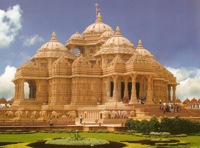Difference between revisions of "Temple"
m (Text replacement - "http://nordan.daynal.org" to "https://nordan.daynal.org") |
m (Text replacement - "http://" to "https://") |
||
| Line 3: | Line 3: | ||
==Etymology== | ==Etymology== | ||
[https://nordan.daynal.org/wiki/index.php?title=English#ca._1100-1500_.09THE_MIDDLE_ENGLISH_PERIOD Middle English], from [https://nordan.daynal.org/wiki/index.php?title=English#ca._600-1100.09THE_OLD_ENGLISH.2C_OR_ANGLO-SAXON_PERIOD Old English] & Anglo-French; Old English tempel & Anglo-French temple, both from [[Latin]] templum space marked out for [[observation]] of auguries, temple, small timber; probably akin to [[Greek]] temenos [[sacred]] precinct, temnein to cut | [https://nordan.daynal.org/wiki/index.php?title=English#ca._1100-1500_.09THE_MIDDLE_ENGLISH_PERIOD Middle English], from [https://nordan.daynal.org/wiki/index.php?title=English#ca._600-1100.09THE_OLD_ENGLISH.2C_OR_ANGLO-SAXON_PERIOD Old English] & Anglo-French; Old English tempel & Anglo-French temple, both from [[Latin]] templum space marked out for [[observation]] of auguries, temple, small timber; probably akin to [[Greek]] temenos [[sacred]] precinct, temnein to cut | ||
| − | *Date: before [ | + | *Date: before [https://www.wikipedia.org/wiki/12th_Century 12th century] |
==Definitions== | ==Definitions== | ||
*1 : a building for [[religious]] [[practice]]: as a often capitalized : either of two [[successive]] national sanctuaries in ancient [[Jerusalem]] | *1 : a building for [[religious]] [[practice]]: as a often capitalized : either of two [[successive]] national sanctuaries in ancient [[Jerusalem]] | ||
| − | :b : a building for [ | + | :b : a building for [https://en.wikipedia.org/wiki/Mormonism Mormon] [[sacred]] ordinances |
:c : the house of [[worship]] of Reform and some Conservative Jewish congregations | :c : the house of [[worship]] of Reform and some Conservative Jewish congregations | ||
*2 : a local lodge of any of various fraternal orders; also : the building housing it | *2 : a local lodge of any of various fraternal orders; also : the building housing it | ||
*3 : a place [[devoted]] to a special [[purpose]] <a temple of cuisine> | *3 : a place [[devoted]] to a special [[purpose]] <a temple of cuisine> | ||
==Description== | ==Description== | ||
| − | A '''temple''' (from the [[Latin]] [[word]] templum) is a [[structure]] reserved for [[religious]] or [[spiritual]] [[activities]], such as [[prayer]] and [[sacrifice]], or [[analogous]] [[rites]]. A templum [[constituted]] a sacred precinct as defined by a [[priest]], or augur. It has the same [[root]] as the word "template," a [[plan]] in [[preparation]] of the building that was marked out on the ground by the [ | + | A '''temple''' (from the [[Latin]] [[word]] templum) is a [[structure]] reserved for [[religious]] or [[spiritual]] [[activities]], such as [[prayer]] and [[sacrifice]], or [[analogous]] [[rites]]. A templum [[constituted]] a sacred precinct as defined by a [[priest]], or augur. It has the same [[root]] as the word "template," a [[plan]] in [[preparation]] of the building that was marked out on the ground by the [https://en.wikipedia.org/wiki/Augur augur]. Templa also became [[associated]] with the dwelling places of a [[god]] or gods. This [[tradition]] dates back to [https://en.wikipedia.org/wiki/Prehistoric_times prehistoric times]. For the [https://en.wikipedia.org/wiki/Ancient_Egyptians ancient Egyptians], the word ''pr'' could refer not only to a house, but also to a [[sacred]] [[structure]] since it was believed that the [[gods]] resided in houses. The word "temple" (which dates to about the [https://www.wikipedia.org/wiki/6th_century_BCE 6th century BCE]), despite the specific set of [[meanings]] [[associated]] with the [[religion]] of the ancient [[Rome]], has now become quite widely used to describe a house of [[worship]] for any number of religions and is even used for time periods prior to the Romans. |
| − | The oldest known temple is "gire navoke" located in North [ | + | The oldest known temple is "gire navoke" located in North [https://www.wikipedia.org/wiki/Kurdistan Kurdistan] dating from the [https://en.wikipedia.org/wiki/10th_millennium_BC 10th millennium BC].[https://en.wikipedia.org/wiki/Temple] |
[[Category: Religion]] | [[Category: Religion]] | ||
[[Category: Architecture]] | [[Category: Architecture]] | ||
Latest revision as of 02:11, 13 December 2020
Etymology
Middle English, from Old English & Anglo-French; Old English tempel & Anglo-French temple, both from Latin templum space marked out for observation of auguries, temple, small timber; probably akin to Greek temenos sacred precinct, temnein to cut
- Date: before 12th century
Definitions
- 1 : a building for religious practice: as a often capitalized : either of two successive national sanctuaries in ancient Jerusalem
- b : a building for Mormon sacred ordinances
- c : the house of worship of Reform and some Conservative Jewish congregations
- 2 : a local lodge of any of various fraternal orders; also : the building housing it
- 3 : a place devoted to a special purpose <a temple of cuisine>
Description
A temple (from the Latin word templum) is a structure reserved for religious or spiritual activities, such as prayer and sacrifice, or analogous rites. A templum constituted a sacred precinct as defined by a priest, or augur. It has the same root as the word "template," a plan in preparation of the building that was marked out on the ground by the augur. Templa also became associated with the dwelling places of a god or gods. This tradition dates back to prehistoric times. For the ancient Egyptians, the word pr could refer not only to a house, but also to a sacred structure since it was believed that the gods resided in houses. The word "temple" (which dates to about the 6th century BCE), despite the specific set of meanings associated with the religion of the ancient Rome, has now become quite widely used to describe a house of worship for any number of religions and is even used for time periods prior to the Romans.
The oldest known temple is "gire navoke" located in North Kurdistan dating from the 10th millennium BC.[1]
